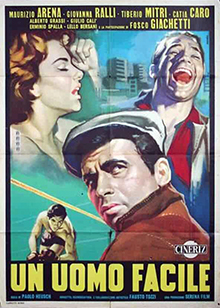This article needs additional citations for verification .(May 2019) |
| The Defeated Victor | |
|---|---|
 Film poster | |
| Directed by | Paolo Heusch |
| Written by | Fausto Tozzi |
| Starring | Maurizio Arena |
| Cinematography | Roberto Gerardi |
| Music by | Carlo Rustichelli |
Release date |
|
Running time | 102 minutes |
| Country | Italy |
| Language | Italian |
The Defeated Victor (Italian : Un uomo facile) is a 1958 Italian drama film directed by Paolo Heusch. It was entered into the 9th Berlin International Film Festival.